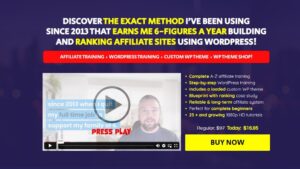Being a life coach is amazing. You get to guide people towards their goals, witness incredible transformations, and be a part of something truly special. But there’s also a not-so-secret truth: building a successful coaching practice can eat up a ton of time.
If you’re finding yourself constantly juggling client calls, fitting in marketing, and dreaming of a beach vacation that doesn’t involve chasing emails, then my friend, you’ve come to the right place. Passive income can be your game-changer.
What is Passive Income, Exactly?
Think of it as this: you put in the work upfront to create something awesome, and then that creation keeps bringing in income without you needing to constantly hustle. Pretty sweet, right?
Here are some quick facts about passive income for life coaches:
Facts#1: The online learning market is booming: It’s expected to reach a whopping $325 billion by 2025! There’s a huge appetite for the kind of wisdom you offer.
Facts#2: It gives you freedom and flexibility: Want to take a weekend getaway or finally write that book? Passive income can give you the time freedom to pursue your passions.
Facts#3: It scales beautifully: Once you create your passive income stream, it can keep bringing in money even while you sleep (or coach other clients!).
Passive Income Ideas for Life Coaches
Alright, so you’re sold on the idea of passive income. But how do you actually make it happen? Here are a few ideas that perfectly suit the life coach skillset. We’ll cover the steps to get started, explore some pros and cons to consider, and even share some resources to help you on your journey.
1. Craft an Online Course:

Distill your coaching magic into a kick-ass online course. This is where you share your best strategies, exercises, and frameworks, all in a convenient, self-paced format. People can learn from you anytime, anywhere, and you get to help more people while freeing up your schedule.
Steps to Take Off:
Pick your niche: What specific area of life coaching do you excel in? Focus on a topic where you have deep expertise and can provide real value to your audience.
Plan your course content: Outline the key modules, lessons, and exercises that will take students from point A (confused and stuck) to point B (empowered and achieving their goals).
Choose your platform: There are tons of amazing online course platforms out there, like Thinkific, Kajabi, or Teachable. Do your research to find one that fits your needs and budget.
Create high-quality content: This is where your magic touch comes in! Develop engaging video lessons, downloadable workbooks, and interactive activities to keep your students hooked.
Pros & Cons
Pros
- Once created, your course can keep bringing in income for years to come, even while you sleep (or coach live clients!).
- A well-designed course positions you as a thought leader in your niche, attracting new clients and boosting your credibility.
- Sell your course online and reach students around the world, no geographical limitations here!
Cons
- Creating a high-quality course takes time and effort. You might need to invest in things like video editing software or graphic design.
- Just building your course isn’t enough. You’ll need a solid marketing strategy to get it in front of your ideal audience.
- The online learning landscape is constantly evolving. Be prepared to update your course content periodically to keep it relevant and engaging.
Resources to Help:
- Thinkific: https://www.thinkific.com/
- Kajabi: https://kajabi.com/
- Teachable: https://teachable.com/
2. Become an E-book Author:
Turn your coaching insights into a powerful e-book. This is fantastic for establishing yourself as an authority and attracting new clients who are just starting their transformation journey.

Steps to Take Off:
Choose your topic: Similar to your online course, select a specific area of life coaching expertise where you can offer unique insights and solutions.
Outline your content: Structure your e-book with a clear introduction, engaging chapters, and a call to action (think: encouraging readers to learn more about your coaching services or online course).
Write with passion: Infuse your e-book with your coaching voice and personality. People are drawn to authentic storytelling and genuine advice.
Design matters: Invest in a professional cover design and consider formatting your e-book for different devices (e.g., tablets, smartphones).
Pros & Cons
Pros
- A well-written e-book establishes you as an authority in your field, attracting potential clients and building trust.
- Once published, your e-book can generate ongoing sales with minimal maintenance required.
- Offer a free chapter or bonus content in exchange for email addresses. This helps you build your email list, a powerful tool for promoting your coaching services and future offerings.
Cons
- Getting your e-book noticed can be challenging. You’ll need a solid marketing strategy to reach your target audience.
- The self-publishing world is crowded. Make sure your e-book offers something unique and valuable to stand out.
- Writing a compelling e-book takes time and dedication. Don’t underestimate the effort involved.
Resources to Empower Your Words:
- Kindle Direct Publishing: https://kdp.amazon.com/
- Draft2Digital: https://www.draft2digital.com/
- E-Reader News Today: http://www.ereadernewstoday.com/
3. Build a Blog (and Email List):

Share valuable content that resonates with your ideal client. This could be anything from bite-sized coaching tips to in-depth articles on overcoming specific challenges. As your audience grows, you can use your email list to promote your coaching services, online course, or even recommend helpful products as affiliates (more on that later).
Steps to Blog Like a Boss:
Pick your niche: Align your blog with your coaching specialty. This helps attract potential clients who are interested in the specific transformations you offer.
Content is king: Publish high-quality, informative blog posts that resonate with your ideal audience. Offer actionable tips, inspirational stories, and practical advice that helps them overcome challenges and achieve their goals.
Consistency is key: Develop a regular posting schedule to keep your audience engaged. Aim for at least one new blog post per week (or more if you can).
Email magic: Build your email list by offering valuable lead magnets like downloadable checklists, cheat sheets, or mini-courses in exchange for email addresses.
Pros and Cons
Pros
- A well-maintained blog attracts potential clients who are already interested in your area of expertise.
- Creating valuable content optimized for search engines can help your blog rank higher in search results, driving organic traffic and attracting new visitors.
- Foster a community around your blog by responding to comments and encouraging discussions. This personal connection builds trust and strengthens your brand.
Cons
- Regularly producing high-quality content takes time and effort. Be prepared to invest in the writing process.
- Building a loyal blog audience takes time. Don’t get discouraged if you don’t see overnight results.
- Blogging involves more than just writing. You’ll also need to learn about SEO, social media promotion, and email marketing.
Resources to Craft Compelling Content:
- HubSpot Academy: https://academy.hubspot.com/
- Copyblogger: https://copyblogger.com/
- Neil Patel: https://neilpatel.com/
4. Rock the Podcast World:

Love to chat and inspire? Start a podcast! This is a fantastic way to connect with your audience on a deeper level and showcase your coaching expertise. Plus, you can use your podcast to promote your other offerings.
Steps to Launch Your Podcast:
Find your podcasting niche: Similar to your blog, focus on a specific area of life coaching where you can provide insightful discussions and captivating episodes.
Format it for fun: Decide on your podcast format, solo episodes where you share your wisdom, interviews with inspiring guests, or a call-in show where you answer listener questions.
Invest in quality audio: Listeners won’t stick around for scratchy audio. Invest in a decent microphone, recording software, and basic editing tools.
Promote like a champion: Once you have a few episodes under your belt, spread the word! Share your podcast on social media, submit it to relevant directories, and consider collaborating with other podcasters in your niche for cross-promotion.
Pros and Cons
Pros
- Podcasts allow you to connect with your audience on a more personal level than text-based content.
- You can record podcast episodes while you’re on the go – perfect for busy life coaches!
- Regularly releasing valuable podcast content positions you as a thought leader in your niche, attracting new clients and boosting your credibility.
Cons
- While recording might be fun, editing podcast episodes can be time-consuming. Factor this into your schedule.
- There’s a bit of a learning curve when it comes to recording and editing audio. Be prepared to invest some time getting up to speed.
- Building a loyal listenership takes dedication and consistent content creation. Don’t get discouraged if you don’t see a million downloads overnight.
Resources to Rock Your Podcast:
- Podcasting 101 by Apple: https://support.apple.com/en-us/HT208394
- Buzzsprout: https://www.buzzsprout.com/
- Transistor: https://transistor.fm/
5. Bonus Tip: The Power of Affiliate Marketing

Let’s say you come across a product or service that perfectly complements your coaching and would benefit your audience. With affiliate marketing, you can recommend it and earn a commission on every sale. It’s a win-win – you provide extra value to your audience, and you generate some passive income on the side.
Steps to Become an Affiliate Marketing Mastermind:
Choose your partners wisely: Only promote products or services that genuinely complement your coaching and provide real value to your audience.
Disclose with transparency: Always be upfront with your audience about affiliate links. Building trust is key.
Integrate seamlessly: Don’t just shove affiliate links in your audience’s face. Weave product recommendations naturally into your content – like mentioning a helpful productivity app in a blog post about time management.
Track and analyze: Most affiliate programs provide tools to track clicks and conversions. Use this data to see what resonates with your audience and refine your approach.
Pros and Cons
Pros
- You don’t need to create a whole new product to generate income. Promote relevant products your audience already trusts you to recommend.
- Once you’ve established your affiliate partnerships, you can earn commissions with minimal ongoing effort.
- Affiliate marketing allows you to recommend a wider range of products and services that complement your coaching, potentially catering to different needs within your audience.
Cons
- Your income depends on the performance of the affiliate program and the quality of the products you promote.
- It takes time to identify affiliate partners that truly align with your values and resonate with your audience.
- Just like with any marketing strategy, it takes time to build trust with your audience and convince them to click on your affiliate links.
Resources to Help You Become an Affiliate Rock Star:
- Affiliate Marketing Guide by Shopify: https://www.shopify.com/blog/affiliate-marketing
- ClickBank: https://www.clickbank.com/
- ShareASale: https://www.shareasale.com/
Conclusion
Building passive income streams takes time and effort, but the rewards are absolutely worth it. The key is to choose something you’re passionate about, create high-quality content, and be patient.
So, what are you waiting for? Start brainstorming your passive income plan today!
Got questions or want to share your own passive income ideas? Let’s chat in the comments below!
Read more:
- Passive Income for Dentists
- Passive Income from Land
- Passive Income for Freelancer
- Hairstylist Hustle: Passive Income for Hairdressers
- Trucking automation passive income
- How to make passive income while in the military
- 10 Side Hustle Ideas
- Become an online notary in Illinois
- Passive Income as a Teenager
- Get Paid to Advertise on Box Truck




